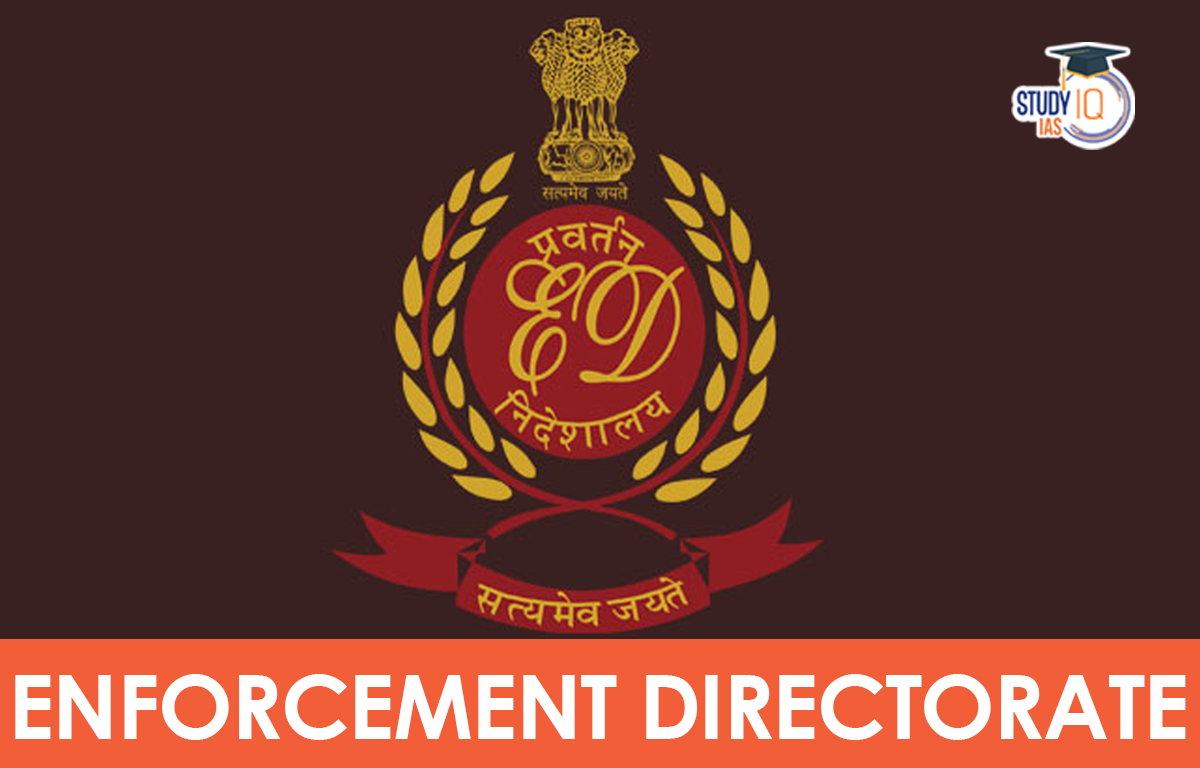Table of Contents
Context
- The Supreme Court granted interim bail to Delhi Chief Minister Arvind Kejriwal in the excise policy case.
- The Court raised the bar for arrest by the Enforcement Directorate (ED) under the Prevention of Money Laundering Act (PMLA), 2002.
More in News
- The SC emphasised that arrests must not be made arbitrarily or based on whims but on valid “reasons to believe,” as prescribed by law.
- This ruling is significant following the 2022 decision in Vijay Madanlal Chaudhary vs Union of India, where the SC upheld most of ED’s powers. This case is the first major instance restricting the central agency’s powers post-2022 ruling.
Enforcement Directorate
The Enforcement Directorate was founded on May 1st, 1956, and is based in New Delhi. It is also known as ED, a law enforcement organization tasked with enforcing economic laws and combating economic crime in India, such as money laundering and foreign exchange irregularities.
According to the terms of the Central Vigilance Commission Act 2003, the director of the Enforcement Directorate is chosen. Since most of the money is kept abroad, the ED has a difficult time following the money’s route.
| Title | Description |
| Purpose | For handling the exchange control law violation under the Foreign Exchange Regulation Act of 1947. |
| Department |
|
| Headquarters | New Delhi, India |
| Head | The Director of Enforcement, an Indian Revenue Service officer. |
| Regional offices | Chandigarh, Kolkata, Chennai, and Mumbai. |
Objectives of ED
The primary goal of the ED is to uphold the provisions of the following two special fiscal laws:
- Foreign Exchange Management Act of 1999 (FEMA)
- Prevention of Money Laundering Act of 2002 (PMLA)
Enforcement Directorate Laws
Investigation of instances involving money laundering and transgressions of foreign exchange laws falls within the purview of the multidisciplinary Enforcement Directorate (ED). It carries out the enforcement of numerous laws.
- Prevention of Money Laundering Act 2002
- Foreign Exchange Management Act1999
- Foreign Exchange Regulation Act 1973
- Fugitive Economic Offenders Act 2018
- Sponsoring Organizations under the 1974 Foreign Exchange Conservation and Smuggling Activity Prevention Act
Background of Enforcement Directorate
- The Enforcement Directorate is in charge of looking into economic crimes and violations of laws governing foreign currency.
- By the Foreign Exchange Regulation Act of 1947 (FERA ’47), the Department of Economic Affairs originally established this Directorate on May 1st, 1956, when it established an “Enforcement Unit” to deal with Exchange Control Law infractions.
- The Legal Service Officer functioning as Director of Enforcement in this unit, which had Delhi as its base of operations, was assisted by three Special Police Establishment Inspectors and an Officer on Appointment from the Reserve Bank of India.
- The branches were situated in Bombay and Calcutta, two cities. In 1957, the “Enforcement Directorate” was given a new name for this organization, and a Madras branch was added.
- In 1960, the Directorate’s management was transferred from the Department of Economic Affairs to the Department of Revenue.
- FERA’47 was eventually repealed and replaced with FERA in 1973.
- For a brief time of four years (1973-1977), the Directorate was still managed administratively by the Department of Personnel & Administrative Reforms.
- The Directorate is currently governed administratively by the Department of Revenue, the Ministry of Finance, and the Government of India.
- As Per the International Anti-Money Laundering framework, the Prevention of Money Laundering Act, 2002(PMLA), was also passed, and on July 1st, 2005, ED was granted responsibility for its enforcement.
- In response to an increase in cases involving economic criminals seeking asylum in other countries, the government recently passed the Fugitive Economic Criminals Act, 2018 (FEOA), and ED is responsible for its enforcement starting on April 21, 2018.
ED’s Power to Arrest
The Prevention of Money Laundering Act (PMLA) gives the ED the authority to detain those who are accused of committing economic crimes. The ED has the authority to conduct searches and seizures of assets and real estate that have been obtained unlawfully. Individuals and organizations whose bank accounts are suspected of being used for money laundering or other economic crimes may have their accounts frozen by the Enforcement Directorate. Properties and assets that were acquired illegally may be seized by the ED.
Generally speaking, the Enforcement Directorate agency is essential to upholding law and order in India’s financial system and safeguarding the rights of the populace.
Key Legal Provisions and Interpretations
- Section 19 of PMLA: Allows an ED officer to arrest a person if there is “reason to believe” that they are guilty of an offence under the Act.
- The SC expressed doubts about the ED’s broad interpretation of “reason to believe,” viewing it as subjective.
- Court’s Clarification: The phrase “material in possession” vs “evidence in possession” was debated.
- The SC asserted that an arrest should be based on admissible evidence and not on inadmissible evidence.
Rigid and Restrictive Arrest Powers
- High Bar for Bail: Given the stringent bail conditions under PMLA, the Court stated that the power to arrest must be rigid and restrictive.
- Purpose of Arrest: The power to arrest under Section 19(1) should not be used for investigation purposes.
- Arrest should occur only when sufficient material enables the officer to form a written opinion of the arrestee’s guilt.
- Safeguards Against Pre-Trial Arrest: The language of Section 19(1) provides stringent safeguards against pre-trial arrests during pending investigations.
- Charge vs. Arrest:
- The Court differentiated between framing charges and arresting individuals.
- An individual can face charges and trial even while on bail.
Structure of Enforcement Directorate
Hierarchy
The Director of Enforcement is in charge of the ED’s New Delhi headquarters. The five regional offices, which are situated in Mumbai, Chennai, Chandigarh, Kolkata, and Delhi, are under the supervision of Special Directors of Enforcement. The Directorate has 10 Zonal offices, each of which is headed by a Deputy Director, in addition to 11 sub-zonal Offices, each of which is managed by an Assistant Director.
Recruitment
Officers may be recruited directly from other investigative agencies or indirectly. It is made up of representatives from the police, excise, customs, and income tax departments of the Indian Revenue Services (IRS), the Indian Police Services (IPS), and the Indian Administrative Services (IAS).
Duration
- The Central Bureau of Investigation (CBI) and Enforcement Directorate directors’ tenure can be extended from two to a maximum of five years thanks to two orders that the President of India issued in November 2021.
- Both the Delhi Special Police Establishment (DSPE) Act, 1946 (for ED) and the Central Vigilance Commission (CVC) Act, 2003 (for CV Commissioners) have been amended to give the government the power to keep the two chiefs in their positions after their initial two-year terms have ended for an additional year.
- The chiefs of the CBI currently serve fixed terms of two years, however, they are now qualified for three yearly extensions. However, no more extensions will be granted following a total of five years, including the duration stipulated in the first appointment.
Functions of Enforcement Directorate
- Investigate money laundering: The ED tracks down proceeds of crime and stops their conversion into legitimate funds.
- Enforce PMLA: They use the Prevention of Money Laundering Act to freeze assets, prosecute offenders, and confiscate ill-gotten gains.
- Combat FEMA violations: The ED ensures compliance with foreign exchange regulations by investigating unauthorized currency movements and transactions.
- Investigate economic offenses: Their scope covers economic crimes like fraud, financial scams, and smuggling that harm the Indian economy.
Enforcement Directorate Jurisdiction
- Either FEMA or PMLA provide coverage for all of India. Therefore, any person to whom this Act applies may be subject to action by the ED. Cases involving FEMA might be heard in civil court, but those involving PMLA would be heard in criminal court.
- The agency has authority over anyone who commits a crime, whether they are a person or a business. All public personnel who participate in a money laundering offence fall under the authority of the agency.
- ED is unable to make decisions on his own. One must first submit a complaint with any other agency or the police before ED looks into the situation and identifies the culprit.
- The ED will investigate the matter, seize any alleged offender’s property, make an arrest, and start legal proceedings for breaking the PMLA and FEMA acts. The matter will be resolved by adjudication by a court under the PMLA.
Enforcement Directorate Special Court
In cooperation with the Chief Justice of the High Court, the Central Government appoints one or more Sessions Courts as Special Courts to hear cases involving crimes punishable under Section 4 of the PMLA. The Central Government shall by notification establish an Appellate Tribunal to hear appeals from decisions of the Adjudicating Authority and the authorities under this Act.
Within sixty days on the day the judgement or order was notified to him, anyone who feels wronged by an Appellate Tribunal decision or order may file an appeal with the High Court. With the proviso that, if it decides that the appellant was prevented from doing so for a valid reason, the High Court may grant an extension of time to submit the appeal of no more than sixty days. The Special Court is also known as PMLA Court.
Enforcement Directorate Criticism
The Supreme Court (SC) is looking into claims that the government and the Enforcement Directorate frequently violated the PMLA. The main accusations are that even “common” crimes are investigated by the PMLA, and real victims’ assets have been taken. In particular, as it relates to the trafficking of illegal substances, the PMLA was a comprehensive penal code created to address the possibility of money laundering. The list of crimes currently covered by the Act’s schedule is extraordinarily broad and, in some cases, has nothing to do with organized crime or drugs.
Enforcement Directorate UPSC
The Government of India’s Enforcement Directorate (ED), a law enforcement organization, is in charge of upholding economic laws and preventing economic crime. This subject must be understood by students studying for the UPSC Civil Service Exam or any other Government Exam. Students can read all the details related to UPSC by visiting the official website of StudyIQ UPSC Online Coaching.


 Mechanisms to Combat Judicial Corruption...
Mechanisms to Combat Judicial Corruption...
 Registrar General and Census Commissione...
Registrar General and Census Commissione...
 Ambedkar Jayanti 2025: Biography, Legacy...
Ambedkar Jayanti 2025: Biography, Legacy...





















